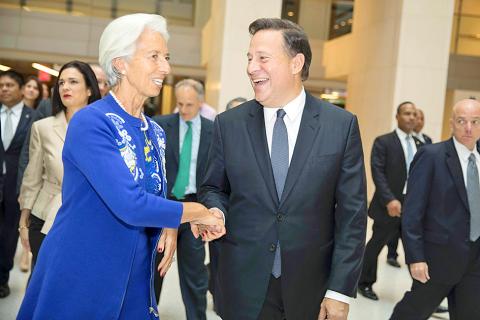There was never any true “diplomatic truce” with China, the Ministry of Foreign Affairs said yesterday, after Panamanian President Juan Carlos Varela attributed last week’s severing of diplomatic ties with Taiwan to the end of the “cross-strait truce.”
“In reality, China’s diplomatic offensive has never stopped,” ministry spokeswoman Eleanor Wang (王珮玲) said, calling on Panama to avoid being used as a tool by China.
She rejected Varela’s claim that he had told President Tsai Ing-wen (蔡英文) and ministry officials in a meeting that Panama would switch recognition to Beijing if the cross-strait “diplomatic ceasefire” ended.

Photo: AFP
Tsai has advocated maintaining the cross-strait “status quo” since taking office, and the government has fulfilled its responsibility of maintaining peace and stability across the Taiwan Strait, the ministry said, accusing China of using “oppression” and “threats” to shrink the nation’s international space.
Interfering with Taiwan’s participation in the World Health Assembly and International Civil Aviation Association, and causing diplomatic allies to break off ties have damaged the peace and stability of the “status quo,” it said.
Although Panama and Taiwan have a good relationship, establishing relations with China was “the right thing to do,” given the end of the cross-strait “diplomatic truce,” Varela told the Inter-American Dialogue, a Washington-based think tank, on Wednesday.
He described the “diplomatic truce” and increased cross-strait exchanges during former president Ma Ying-jeou’s (馬英九) time in office as a “success story,” which had suddenly changed.
Varela said he advised Tsai and other Taiwanese officials to ease cross-strait tensions during their visit to Panama last year, and that he told them: “If the diplomatic truce ends, Panama will switch recognition.”
Sao Tome and Principe switching recognition to Beijing last year caused him to conclude that the diplomatic truce had ended, Varela said, adding that he immediately initiated negotiations with Beijing.
Panama “did not demand anything” in exchange for switching recognition, he said.
He had decided that Panama should turn to Beijing after China impressed him with its “economic might” during a trip in 2007.
“Why should we not switch Panama’s diplomatic recognition?” he said, citing substantial Chinese investment and construction projects in his nation.
Varela said he notified the US of the switch three or four hours prior to his televised announcement and that Panama “did not need consent from anyone.”
Taiwan was reportedly notified only 40 minutes before the announcement.

The CIA has a message for Chinese government officials worried about their place in Chinese President Xi Jinping’s (習近平) government: Come work with us. The agency released two Mandarin-language videos on social media on Thursday inviting disgruntled officials to contact the CIA. The recruitment videos posted on YouTube and X racked up more than 5 million views combined in their first day. The outreach comes as CIA Director John Ratcliffe has vowed to boost the agency’s use of intelligence from human sources and its focus on China, which has recently targeted US officials with its own espionage operations. The videos are “aimed at

STEADFAST FRIEND: The bills encourage increased Taiwan-US engagement and address China’s distortion of UN Resolution 2758 to isolate Taiwan internationally The Presidential Office yesterday thanked the US House of Representatives for unanimously passing two Taiwan-related bills highlighting its solid support for Taiwan’s democracy and global participation, and for deepening bilateral relations. One of the bills, the Taiwan Assurance Implementation Act, requires the US Department of State to periodically review its guidelines for engagement with Taiwan, and report to the US Congress on the guidelines and plans to lift self-imposed limitations on US-Taiwan engagement. The other bill is the Taiwan International Solidarity Act, which clarifies that UN Resolution 2758 does not address the issue of the representation of Taiwan or its people in

US Indo-Pacific Commander Admiral Samuel Paparo on Friday expressed concern over the rate at which China is diversifying its military exercises, the Financial Times (FT) reported on Saturday. “The rates of change on the depth and breadth of their exercises is the one non-linear effect that I’ve seen in the last year that wakes me up at night or keeps me up at night,” Paparo was quoted by FT as saying while attending the annual Sedona Forum at the McCain Institute in Arizona. Paparo also expressed concern over the speed with which China was expanding its military. While the US

SHIFT: Taiwan’s better-than-expected first-quarter GDP and signs of weakness in the US have driven global capital back to emerging markets, the central bank head said The central bank yesterday blamed market speculation for the steep rise in the local currency, and urged exporters and financial institutions to stay calm and stop panic sell-offs to avoid hurting their own profitability. The nation’s top monetary policymaker said that it would step in, if necessary, to maintain order and stability in the foreign exchange market. The remarks came as the NT dollar yesterday closed up NT$0.919 to NT$30.145 against the US dollar in Taipei trading, after rising as high as NT$29.59 in intraday trading. The local currency has surged 5.85 percent against the greenback over the past two sessions, central